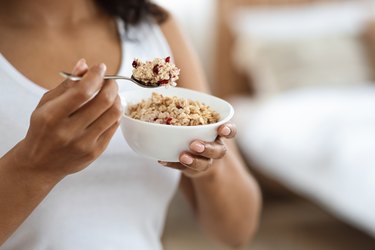
Whole grains such as oats are good for your health and considered an important part of a balanced diet. But can eating oatmeal and other foods containing oats also help extend your life and even fight cancer? Read on to learn about this and more.
Video of the Day
Video of the Day
Oats and Cancer
Oatmeal is one of the many foods made from oats, a type of whole grain high in soluble fiber, important for heart and colon health. The American Heart Association (AHA) recommends that you consume at least three servings of fiber-rich whole grains every day. Plain steel-cut or old-fashioned oats fit the bill, plus they contain no sugar, sodium or preservatives.
But, might eating oat-containing foods such as oatmeal fight cancer, too?
"The scientific reports are not conclusive, but there is evidence that eating oatmeal in your regular diet can help fight cancer, especially colon cancer," says Wasif M. Saif, MD, deputy physician-in-chief and director of medical oncologist at the Northwell Health Cancer Institute in Lake Success, New York. "It is possible that the fiber in the oatmeal does play a role to lessen the risk and may also indicate the healthy lifestyle of those individuals."
What's more, consumption of whole grains such as oats may reduce the risk of premature death and has been linked with overall lower mortality rates, according to a meta-analysis conducted by researchers from Harvard T.H. Chan School of Public Health and published in June 2016 in the journal Circulation. The analysis, including data from 14 studies involving nearly 800,000 people, found that those who consumed the most whole grains had the greatest reduced risk of death over the course of the study period.
How Oats Help
"Oats are loaded with dietary fiber and believed to contain more than many other grains," says Dr. Saif. "In addition, oats also have cholesterol-lowering properties, may help to reduce body mass index and contain antioxidants such as avenanthramides, known to have anti-inflammatory [properties] and to lower blood pressure by increasing nitric oxide production."
According to Sharon Zarabi, RD, CDN, bariatric program director at Lenox Hill Hospital in New York City, whole oats also contain a type of fiber called beta glucan. "In the gastrointestinal tract, it helps increase bile acid excretion and transmit toxins out of the gut," she says. "This in turn reduces cholesterol and helps clean out the digestive system of any 'sludge.'"
Other Good Foods for Cancer Patients
Oats aren't the only food good for people with cancer. "The best cancer-fighting foods in general include fruits — apple, banana and berries, vegetables — especially cruciferous vegetables and carrots, legumes, fatty fish and walnuts," Dr. Saif says. "However, the definitive role of many foods has not been confirmed in randomized studies."
He cautions that those being treated for cancer should avoid extreme diets in favor of a balanced diet. "Ask your oncologist or a nutritionist if you need extra calories and protein to keep your strength up during treatment," he says.
Dr. Saif also recommends that both doctor and patient should pay close attention to any interaction between foods consumed and chemotherapy, adding that those being treated for cancer should make sure that juices and other foods consumed are pasteurized to eliminate unwanted bacteria.
In addition, he suggests that anyone with cancer should:
- Choose whole-grain breads and cereals.
- Drink 100 percent fruit or vegetable juices.
- Consume vegetables and fruits.
- Consider meatless meals such as vegetarian lasagna or vegetable stir-fry.
- Have a leafy green salad with dinner unless you've been told to avoid raw foods.
- Pick lean meats and fish over fatty red meat and processed meats.
According to Dr. Saif, there are also certain foods that should be avoided while undergoing certain types of chemotherapy, such as folic-acid-containing foods during the administration of fluorouracil or capecitabine.
He also notes that some patients don't feel hungry on some days and may need nutrition support and encouragement. On good days, he recommends eating lots of protein and other healthy calories to keep the body strong and help repair damage from treatment.
Read more: 12 Easy, Savory Oatmeal Recipes for Any Time of Day
- Wasif M. Saif, MD, deputy physician-in-chief, director of medical oncology, Northwell Health Cancer Institute, Lake Success, New York
- Sharon Zarabi, RD, CDN, dietitian/nutritionist, bariatric program director, Lenox Hill Hospital, New York City
- American Heart Association: “Types of Whole Grains”
- Circulation: “Whole Grain Intake and Mortality From All Causes, Cardiovascular Disease, and Cancer: A Meta-Analysis of Prospective Cohort Studies”
Is this an emergency? If you are experiencing serious medical symptoms, please see the National Library of Medicine’s list of signs you need emergency medical attention or call 911.